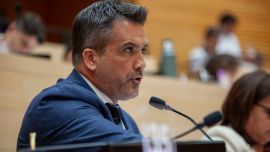The International Monetary Fund does not have a "specific timetable" for negotiating a new funding agreement with Argentina, says the multilateral lender’s top spokesperson
The clarification was issued by Julie Kozack, the Fund's communications director, in response to remarks by Argentina’s Economy Minister Luis Caputo, who said this week that a new programme could be secured “this year.”
Argentina wants the International Monetary Fund, with which it already has a US$44-billion loan programme, to lend it more money, primarily to assist the nation in removing its strict currency controls.
The so-called ‘cepo,’ which limits access to dollars in a country where the US currency serves as a safe haven for savings, has been in place since 2019. President Javier Milei has said in recent months that he wants an additional US$15 billion in order to smooth their removal.
Caputo, speaking in a radio interview on Thursday, did not provide figures, but said he was optimistic that a new deal providing fresh IMF funds could be sealed by the year’s end.
"We are starting to talk about the new agreement, to think [about reaching an agreement] in September is a lot, but for sure this year," Caputo said.
He specified that "it could mean fresh funds.”
However, Kozack denied those reports on Thursday at a press conference in Washington.
The IMF "will engage in discussions on a possible new arrangement … once the authorities formally request it" but "at this stage there is no specific timetable for such discussions," she said.
"Our exchanges remain frequent and constructive," the official added.
Nevertheless, she reiterated that the Fund is satisfied with the recent economic measures taken by Argentina, which is facing a severe recession. Gross domestic product slumped 5.1 percent year-on-year in the first quarter of 2024, inflation is running at an annual 280 percent and more half the population is living in poverty.
Kozack acknowledged the challenges but highlighted the “quite positive" developments seen in recent weeks, such as the approval in Congress of "crucial fiscal and structural measures.”
The IMF spokesperson highlighted, above all, income tax reform because it "brings more formal sector workers with higher incomes into the tax net, thus supporting incomes in Argentina and also improving the burden sharing of fiscal consolidation.”
Approval of Milei's package of reforms to liberalise the economy demonstrates, according to the IMF spokeswoman, "the administration's willingness and ability to find a political compromise.”
Preliminary data, she added, "suggest that fiscal and reserve targets continue to be met … [with] further reductions in inflation and some stabilisation of economic activity and demand."
"All this says, and as we have said many times before, that continued efforts are necessary to continue stability and ensure economic recovery and our team is actively engaged with the authorities to this point," she said.
The relationship between the IMF and Argentina’s government has taken a good turn since Milei’s arrival in office last December, but it has not been without disagreements.
Milei himself has implicitly criticised Rodrigo Valdés, the Fund's director for Latin America and the Caribbean, who negotiates with Caputo on behalf of the IMF.
Without naming him, Argentina’s President accused Valdés in a social media post of being a member of the “São Paulo Forum” – a reference to a leftist political group in the region.
Kozack came out in defence of the official in the presser.
IMF Managing director Kristalina Georgieva has "full confidence in Rodrigo Valdés and his entire management team," said the spokesperson.
Kozack added, however, that the relationship with the Argentine authorities is "active and constructive".
Finally, the IMF spokesperson played down tensions on foreign exchange markets, stating it is “inevitable that countries that apply these types of stabilisation programmes will have periods of volatility.”
"The key here, for policymakers, as they look at this volatility, is to stay nimble with policies and evolve to continue to address the macroeconomic imbalances that exist. And this is exactly what the Argentine authorities are doing," she stressed.
– TIMES/AFP/NA


























Comments